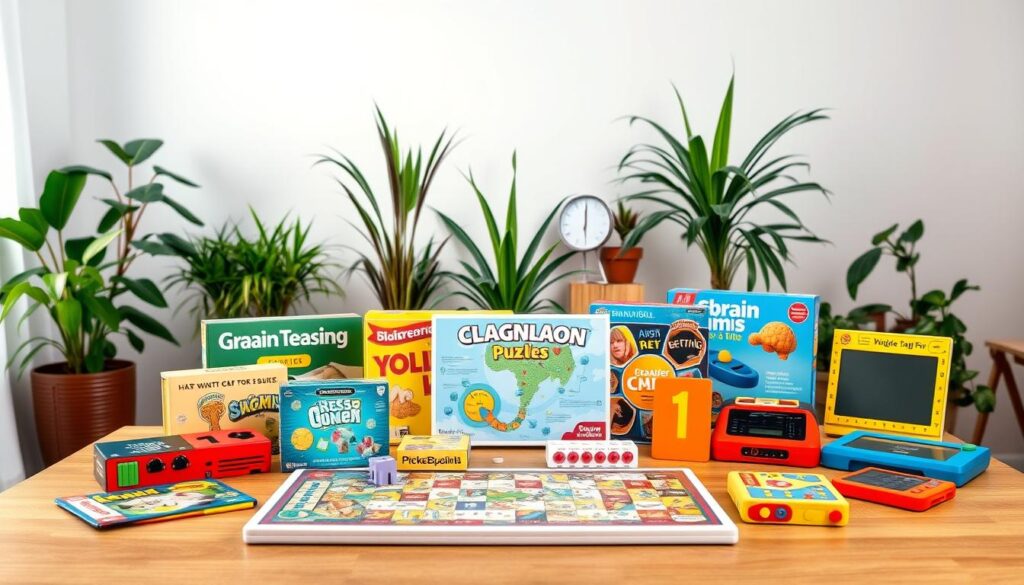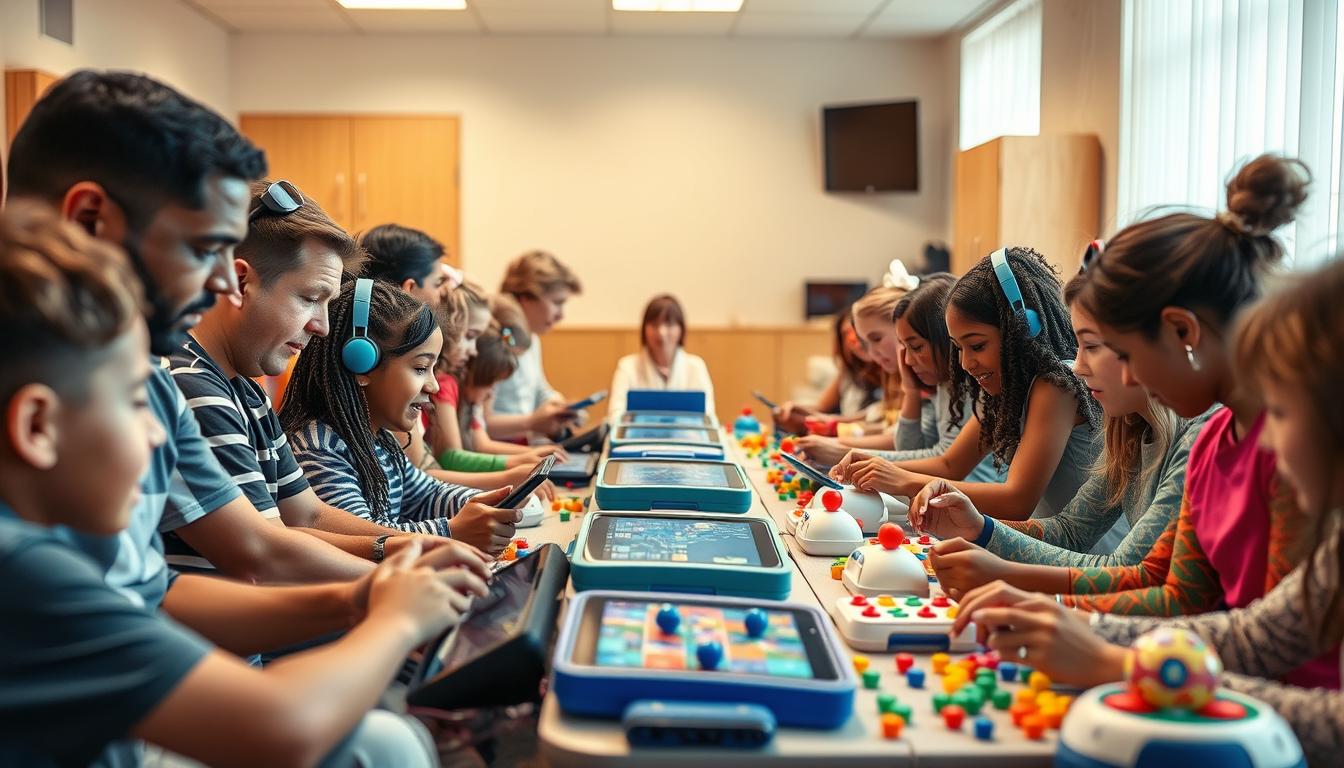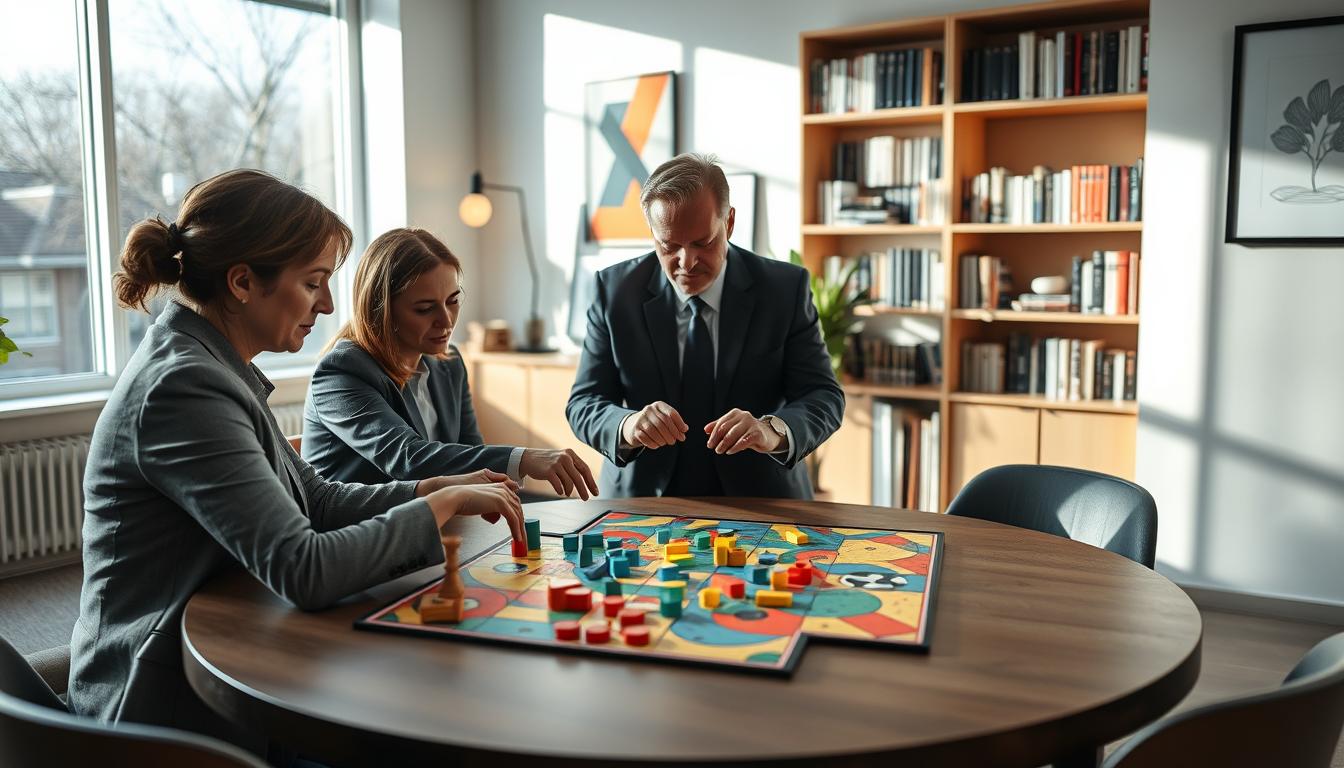Educational games to stimulate the brain after mild brain injuries
Can playing a simple game actually help heal the brain? For many recovering from mild brain injuries, engaging with educational games is a surprising yet powerful tool. These activities offer a fun way to challenge the brain and help it recover.
They not only provide entertainment but also play a key role in cognitive stimulation. This is thanks to the brain’s amazing ability to change and adapt, known as neuroplasticity. By adding brain injury games to their rehabilitation plans, people can improve their thinking skills while having fun.
Understanding Mild Brain Injuries
Mild brain injuries, like concussions, are often not well understood. They can greatly affect how we think and act. A concussion happens when the head hits something hard or shakes a lot, messing with brain work.
People with these injuries might feel headaches, get confused, feel dizzy, or have trouble focusing. These symptoms can be tough to deal with.
How fast someone recovers from a brain injury can vary a lot. Some get better quickly, while others struggle for a long time. Things that can affect recovery include age, health, and how many times someone has been injured before.
Neuroplasticity is key in recovery. It’s the brain’s ability to change and heal itself. This helps people get better, even after a mild brain injury.
The Importance of Cognitive Recovery
Cognitive recovery is key in brain injury rehabilitation. Doing cognitive tasks helps in healing. Survivors often struggle with memory, attention, and solving problems.
Tasks, whether in programs or fun activities, boost brain function. Neuropsychology shows the brain can change and adapt after injury. This means we need to keep challenging our brains.
Memory and attention exercises are crucial in recovery. They help restore brain functions and improve life quality. Programs with various cognitive tasks lead to better results, showing the value of being active in recovery.
How Games Encourage Neuroplasticity
Neuroplasticity is the brain’s ability to change and adapt after injury. It’s key for those recovering from mild brain injuries. Playing cognitive games helps a lot in this area. These games create new paths in the brain, helping it function better.
Games are a fun way to improve brain function, unlike boring traditional methods. They make learning exciting, which boosts brain adaptability. Players must think and plan, making their brains work harder and grow stronger.
Games also make recovery more enjoyable and motivating. The mix of fun and challenge is crucial for better cognitive recovery. So, games are not just for fun; they help the brain stay flexible and adaptable.
Benefits of Educational Games for Brain Injury Recovery
Using educational games in brain injury recovery has many benefits. They make the process fun and engaging. This makes it easier for patients to take part, as it feels more like a game than a task.
Games can also boost cognitive skills like memory and problem-solving. These skills are key for recovery. Unlike boring exercises, games make challenges fun and rewarding.
Games also offer a social benefit. Playing with family or friends adds a sense of community. It shows that you’re not alone in your recovery journey.
| Benefits of Games | Description |
|---|---|
| Enhanced Engagement | Games create an interactive experience that draws players in, making participation in recovery less of a chore. |
| Cognitive Skill Development | Playing games can improve memory, attention, and problem-solving skills critical for recovery. |
| Improved Motivation | Rewards and achievements in games boost motivation levels in players, countering frustration during traditional exercises. |
| Social Interaction | Playing games with others provides social support, fostering connections that aid emotional well-being. |
Types of Cognitive Skills Enhanced by Games
Educational games are great for boosting different cognitive skills. Playing games can help improve these skills, especially for those recovering from brain injuries. As players dive into these games, they see their skills grow.
Problem-solving is a key skill that games help improve. Games often challenge players to think critically and find creative solutions. This helps players develop a problem-solving mindset.
Memory games are also effective. They help players remember things better. By playing these games, players can improve their memory in a fun way.
Games also sharpen attention to detail. Players learn to notice small changes and focus on several things at once. This skill helps them concentrate better in daily life.
Critical thinking is another skill that games enhance. Players learn to evaluate information, analyze options, and make smart choices. This skill is useful in many real-life situations.
Top Educational Games for Adults After Brain Injuries
Looking into the best educational games for adults with brain injuries can really help. Playing different games can boost your mind and help you heal. We’ve sorted out some top games into three groups: card games, word games, and strategy games. Each group has its own benefits and can help with brain recovery.
Card Games
Card games are great for adults recovering from brain injuries and are fun with friends. Games like UNO and Poker are not just fun but also improve memory and thinking skills. They make you remember rules, keep track of cards, and make quick decisions, which helps your brain.
Word Games
Word games test your language skills and help you learn new words. Games like Scrabble and Scattergories make you think deeply and creatively. They’re especially good for those who want to get better at speaking and writing after a brain injury. Playing with words helps your brain make new connections.
Strategy Games
Strategy games, like Chess and Settlers of Catan, need you to think deeply and solve problems. They make you plan, guess what others will do, and change your plans. These games are great for improving your thinking and problem-solving skills.
| Game Type | Example Games | Cognitive Benefits |
|---|---|---|
| Card Games | UNO, Poker | Memory, Strategic Thinking |
| Word Games | Scrabble, Scattergories | Vocabulary, Critical Thinking |
| Strategy Games | Chess, Settlers of Catan | Problem-Solving, Reasoning |
Playing these games is key for those recovering from brain injuries. Picking the right game keeps you interested and helps your brain grow. It also helps you connect with others.

Simple Card Games to Start With
Simple card games are great for those recovering from brain injuries. They offer a fun way to improve thinking skills. Games like “Go Fish” and UNO are perfect because they’re easy to learn and fun to play.
Playing educational card games helps with memory and focus. They also make socializing fun. For example, “Go Fish” helps remember cards, while UNO improves quick thinking.
These simple card games are easy to start with and help improve thinking. They mix fun with learning, preparing players for more challenging games as they get better.
Engaging Word Games for Language Skills
Word games are a great way to boost language skills and have fun. Games like Scrabble and Scattergories help improve vocabulary. They make players think creatively and strategically.
These games sharpen vocabulary and improve thinking skills. Players learn to make connections between words. It’s a fun way to learn and grow.
These games are especially good for people recovering from brain injuries. They help with social skills and emotional healing. Adding them to your daily routine can help improve communication and expression.
Advanced Strategy Games for Cognitive Challenge
Advanced strategy games for adults are a fun way to challenge your mind. They require critical thinking and planning ahead. Chess and Settlers of Catan are great examples of how strategy meets mental sharpness.
Every move in these games is a test of foresight and adaptability. Players must think about what others might do next. This helps improve thinking on your feet and making better decisions.
These games are complex and engaging. Chess is all about looking ahead and anticipating moves. Settlers of Catan involves managing resources and making deals, which boosts negotiation skills.
Playing these games is not just fun; it’s also a way to grow. By tackling these challenges, you can overcome mental obstacles and improve your recovery.
How to Choose the Right Game
Choosing the right game for recovery after a brain injury is important. You need to think about your abilities and what skills you want to improve. Games should match your skill level and help with memory, attention, or problem-solving.
It’s key to find games that are just right. A game that’s too simple won’t challenge you enough. But a game that’s too hard can make you feel frustrated and stop playing. The goal is to make playing games a positive experience that keeps you coming back.
Here are some things to keep in mind:
- Skill Level: Know your current abilities.
- Game Objectives: Decide which skills you want to improve.
- Engagement Factor: Pick games that keep you interested and motivated.
- Difficulty Gradation: Look for games with adjustable difficulty levels.
By considering these factors, you can make your learning experience better. And make sure the games you choose are right for your recovery. The main goal is to help your brain grow without feeling discouraged. So, picking the right games is a big part of getting better.
Setting Up a Safe and Fun Environment
Creating a safe gaming environment is key for a fun gaming experience, especially for those recovering from mild brain injuries. A well-planned setup for games can greatly improve engagement and activity effectiveness. Start by making sure the gaming area is comfy, with good seating that supports you.
An inviting atmosphere, with the right lighting, makes playing more exciting. This encourages people to play more often.
To focus better, reduce distractions in the gaming area. Place the setup away from loud or messy places. Keep all needed supplies, like cards or digital devices, within reach. This makes playing smoother and keeps everyone interested.
Changing up the gaming environment now and then keeps things fresh and fun. This keeps the participants excited and engaged.
In the end, a cozy and organized environment makes gaming sessions more enjoyable. By considering these tips, people can make the most of their cognitive recovery while having fun in a safe, interactive space.
Tips for Encouraging Regular Game Play
Keeping up with a regular gaming routine is key for brain recovery after a mild injury. To make encouraging gameplay easier, set a schedule. Choose specific times each week for gaming to build a habit. This habit not only improves skills but also keeps you motivated.
Playing with a friend can add fun and support. Playing with friends or family makes gaming more fun. It also keeps you on track with your gaming goals.
Keeping a journal or using apps for tracking progress is helpful. Celebrating small wins shows the value of gaming time. Seeing your progress keeps you excited about gaming.
| Game Play Strategies | Benefits |
|---|---|
| Set specific playtimes | Creates consistency in routine |
| Engage with a partner | Encourages social interaction and support |
| Track progress | Reinforces motivation via visible improvement |
| Try different game genres | Keeps engagement fresh and stimulating |
Using these tips daily can make gaming a powerful tool for brain recovery. It makes the journey both successful and fun.

Incorporating Technology in Brain Games
Technology has changed how we play games, especially for those recovering from brain injuries. Digital brain games and apps are great tools. They make learning fun and effective.
The CT Speech and Cognitive Therapy App is a great example. It helps with memory, attention, and solving problems. It’s designed to fit your needs and pace.
Technology also helps by showing how far you’ve come. This can really motivate you to keep going. You can see your progress and stay focused on your goals.
| Type of Technology | Examples | Benefits |
|---|---|---|
| Cognitive Apps | CT Speech and Cognitive Therapy App, Lumosity | Customized exercises for cognitive enhancement |
| Digital Brain Games | Peak, Brain Age: Train Your Brain in Minutes a Day | Fun methods to improve memory and focus |
| Wearable Technology | NeuroSky, Muse | Real-time feedback on cognitive performance |
Using these new tools can really help in recovering from brain injuries. Playing digital brain games makes you feel accomplished. It also helps you keep improving your brain skills. Technology is a big part of a complete recovery plan.
The Role of Social Interaction in Game Play
Social interaction in games is key for those recovering from mild brain injuries. Playing with family and friends boosts communication and social skills. These interactions also help in cognitive recovery.
Multiplayer games offer chances for teamwork or competition. This can motivate players to be more active. It helps in improving cognitive skills and fights off feelings of loneliness during recovery.
Here are some benefits of multiplayer games for social interaction and cognitive growth:
- Strengthens communication skills: Players learn to share their thoughts and work together.
- Encourages teamwork: Team play improves problem-solving and creates a sense of community.
- Reduces isolation: Regular talks with others can lessen loneliness.
- Boosts motivation: Friendly rivalry can push players to get better.
Looking at social interaction in games, multiplayer games do more than entertain. They are powerful tools for cognitive rehab. They make the player’s experience richer and help in a healthier recovery.
Monitoring Progress in Cognitive Recovery
It’s key to watch how someone recovers from cognitive issues. By tracking their progress, both the person and their caregivers can see if treatments are working. This helps spot what’s going well and what needs more work.
There are good ways to keep an eye on cognitive recovery. Regular checks and using special tests are two of them. These tools give numbers that help pick the best games and strategies for recovery.
| Assessment Type | Description | Frequency |
|---|---|---|
| Standardized Tests | Formal evaluations focusing on memory, attention, and processing speed. | Every 2 weeks |
| Observational Reports | Informal observations during game play, measuring engagement and skill application. | Weekly |
| Self-Reports | Subjective feedback from the individual on perceived cognitive improvements and challenges. | After each session |
Regular checks can really motivate people. Seeing how far they’ve come can be very encouraging. Using both numbers and personal stories gives a full picture of how someone is doing. This helps make the recovery plan more personal and effective.
Resources for Finding More Games
Finding new games for cognitive recovery can really help in the rehabilitation journey. Many online platforms and community resources are available. They help individuals and caregivers find educational games that boost brain activity.
Websites focused on game resources sort games by skill level, type, and cognitive focus. This makes it easier to pick the right games for you.
Local rehabilitation centers also offer workshops or classes with engaging games. These places are great for socializing and learning. People can share their game experiences and get tips from others.
Online forums and social media groups for brain injury recovery are also great resources. Members share tips on effective tools and success stories. These spaces offer support and help keep the focus on fun, cognitive improvement.
Conclusion
Educational games offer a great chance for those recovering from mild brain injuries. They make learning fun and engaging. This helps in improving cognitive skills needed for recovery.
It’s key to pick games that match your needs and progress. The right game can make a big difference in recovery. Playing games boosts mental abilities and keeps you motivated during rehab.
Using educational games can make recovery easier and more fun. By focusing on fun and interaction, people stick to their recovery plans. This leads to better mental health over time.
FAQ
What are mild brain injuries and how do they occur?
Mild brain injuries, like concussions, happen from a head blow, a fall, or sports. They cause headaches, dizziness, confusion, and short-term thinking problems.
How do educational games aid in cognitive recovery?
Educational games boost brain skills through fun tasks. They strengthen and create new brain paths, key for healing after mild brain injuries.
What types of cognitive skills can be improved through gameplay?
Games improve skills like solving problems, remembering things, paying attention, thinking critically, and speaking well. These skills help the brain work better.
What are some examples of educational games for recovery?
Great games include UNO and Go Fish card games, Scrabble and Scattergories word games, and Chess and Settlers of Catan strategy games. Each game targets different brain skills.
How can I choose the right game for someone with a mild brain injury?
Pick a game based on the person’s brain skills, the skills you want to improve, and their comfort with game complexity. This ensures a fun and effective experience.
What environment is best for gaming during recovery?
A safe, comfy spot is key for gaming success. Make sure the seating is right, keep distractions away, and have supplies within reach. This encourages regular gaming.
How can technology be incorporated into brain injury rehabilitation?
Digital games and apps, like the CT Speech and Cognitive Therapy App, are great tools. They make learning fun and accessible, targeting specific brain skills.
Why is social interaction important during gameplay?
Playing with others boosts communication and fights loneliness. Games with family and friends create a supportive space for brain healing.
How should progress in cognitive recovery be monitored?
Keep track of brain skills and how much you play. This info helps tailor games for better recovery, making the process more effective.
Where can I find more educational games suitable for brain injury recovery?
Look online, visit local rehab centers, or join community groups. They offer more games and activities to aid in recovery.














